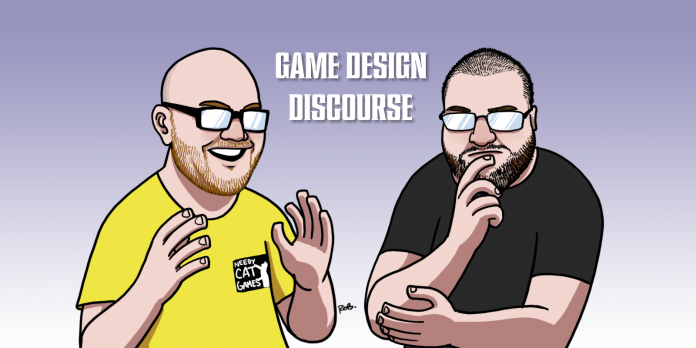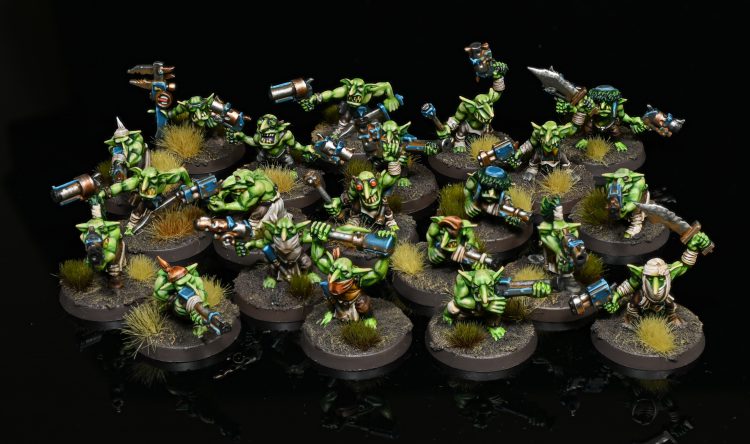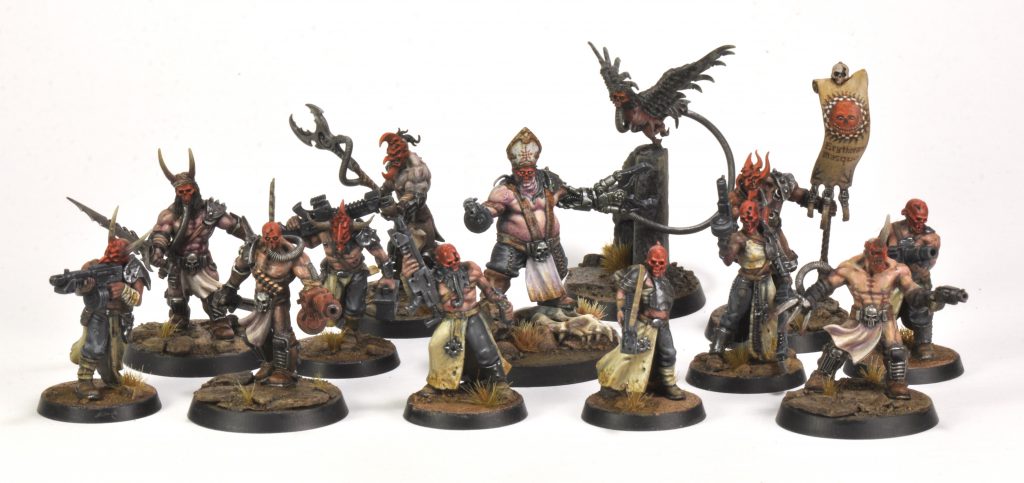In our Game Design Discourse series we join James M Hewitt from Needy Cat Games and our own Edwin “Lupe” Moriarty for chats about game design theory and practice. James worked for Games Workshop as part of the Citadel studio rules team, before becoming a founding member of the newly created Specialist Games Team. He now operates Needy Cat Games with his partner Sophie, another GW studio veteran. Edwin is a freelance game designer who has worked, among many other projects, with Needy Cat Games on Hellboy: the Board Game.
Needy Cat Games run a number of game design and development courses and seminars which are a fantastic opportunity to learn from hugely experienced and skilled industry veterans. You can sign up for their courses on their website.
Lupe: So a while ago we were having a conversation about the idea of emotional outcomes in games, and you talked about how designing a game is sometimes about managing the emotional outcomes for players. Is that something that is a priority in your head when you’re designing a game?
James: Absolutely, 100%, yeah. To me a game is much more than a collection of mechanics or ideas. I’ve often talked about game design being a bit like writing sheet music, in that what you’re creating, your finished product, is not the finished thing, because it needs to be given to someone for them to go and play it. What that means is that the essential ingredient of game design is player interaction and how players interact with each other and the game. So I think as a designer, you have a duty to consider, as carefully as you can, the emotional outcomes of the game. I think that can manifest in many different ways.
So, for example, thematically. When we were designing Hellboy, the board game, we put a lot of work into evoking the correct feelings. What should a Hellboy case file feel like? How should the players be reacting emotionally? In the comics there’s a sense of mystery and intrigue, of collaboration and teamwork. So that’s kind of one way for emotion to come into things.
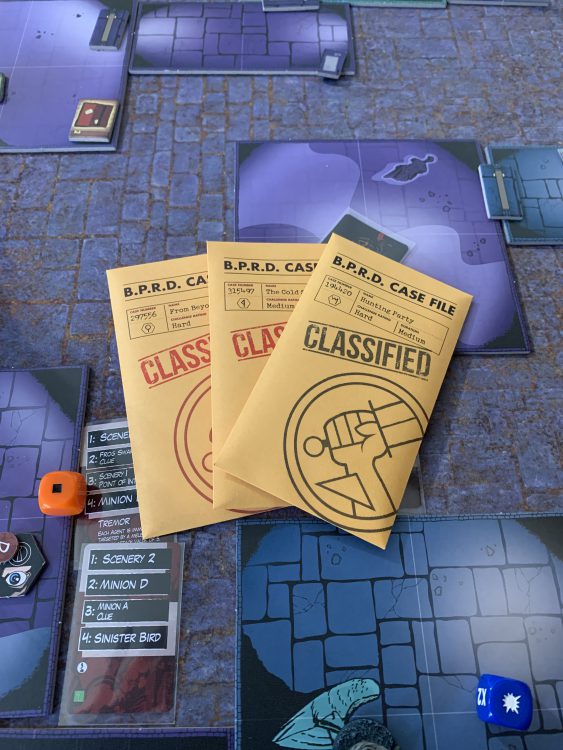
But also, you can think about the emotion that is caused by things that happen in the game, you know? So, for example, I suppose you could call it “emergent emotion” in the same way you get “emergent narrative” in games, which comes from things happening in the game, which provide a story which the players interpret. The story is the same sort of thing: things happen in the game, which create emotion. And so when a dice roll goes against the odds and goes really well, that is an emotional response. When people talk about their favourite moments in games, a lot of times they come down to unbelievably lucky rolls, or things that shouldn’t have happened, or moments that were unexpected. And I think there’s something there, isn’t there? The fact that when people talk about their favourite moments in games, they very rarely do the Red Dwarf Arnold Rimmer “…and then I rolled a six, and then he rolled a six…”. It’s much more that they talk about the emotion.
Lupe: Yeah! I’m thinking about how it isn’t necessarily about those things being unlikely. I mean, that’s interesting to me, because I wonder if it’s partly the perception of it being unlikely, if not necessarily genuinely being unlikely. But also, I wonder if there’s something, because you mentioned narrative and I think a lot of emotion flows from narrative, whether that’s the emergent narrative of playing a game or whether that’s intended narrative. And I wonder if this is necessarily because in a lot of narratives we have, there is this thing where “against the odds, the heroes succeed or overcome”. Is this a reflection of that cultural narrative?
James: Oh, there’s a question. Yeah, I suppose that is part of it, isn’t it? I mean, if you’re playing a game, you know, generally you see your characters as the good guys, presumably. If you’re playing a game of 40k, you see your army as the protagonist. You want them to do well. So when they stop and do anything, even if that is completely expected, you know, if it’s something that is completely in your favour and you still do well, that still feels good. But I suppose that’s the thing isn’t it? Because surprise is only one emotion. You know, talking about emotional outcomes, surprise is only one of them. But also you have other things like, you know, satisfaction. Satisfaction that you’re doing well, that you’re doing your thing. Even the negative ones, I’ve had very exciting games where I’ve felt compelled and engaged by the fact that I’ve got a very unlikely dice roll and I failed it, and now I feel fear almost. I suppose it partly comes down to resonance doesn’t It? Not just things happening that are surprising, or things that are happening which tie in with what you expect.
Lupe: Yeah. Are we going to stray into Ludonarrative Dissonance, which I believe is a phrase that has to, by law, appear in any conversation about game design?
James: I’m glad you fulfilled that obligation there, to mention it at least once.
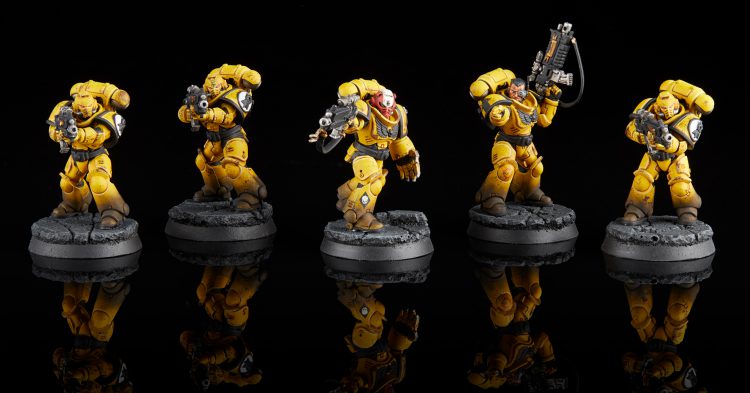
Lupe: Well, it’s interesting, because of what you’re saying about satisfaction. If I have a unit of Primaris space marines, and I open fire on a unit of Grots, and I don’t wipe them out, or mostly wipe them out… well, if I do wipe them out, it’s not a great heroic action. I was expected to. But if I don’t, there is some level of dissatisfaction there, where it’s not unfolded in the way that I’m expecting, where I feel like it should.
James: Absolutely. I was gonna say, this all comes back to me with one of the key things with game design is in play testing. You’re not just putting two forces – say playtesting 40k, new faction, whatever it might be – you’re not just putting down the two forces on the table and watching the game play out and looking at the numbers, how do the point values track and things, you’re looking at how the players engage with that. So when we play test at Needy Cat, we watch our playtesters. We look for body language, for how engaged they are, how excited they are, because you can polish the numbers as much as you like and get the “balance” – I’m doing inverted air quotes, but you can’t tell – getting the balance spot on. But if it isn’t engaging the players, then you’re missing a trick. And I think that is where it comes back to that question you asked about, you know, emotional outcomes versus mechanical considerations, which is that mechanics can be spot on, but if they’re not generating emotion, something isn’t right.
Lupe: And also, if they’re generating the wrong emotion, I think there’s definitely a big issue there.
James: Yeah, absolutely. Precisely.
Lupe: It’s one of the interesting things, that when I’m talking to playtesters I’m often asking them “This is the kind of the narrative, this is what you should expect. Does your play meet this expectation? Does it feel right?” And often that’s a much more important question to me than you know, “Did you win too easily, or was it too hard?”, those kind of balance considerations. I wonder if that’s again about having the game mechanics and the narrative meet and mesh, and I think a lot of the big complaints that I see about 40k and Age of Sigmar, those kinds of games, when there are units or factions that don’t play in the way that people feel like they should, or they play in a way that is efficient but boring, those are the interactions that people seem to really dislike. Is that a function of the emotional outcomes not meeting the requirement?
James: Yeah, I think so. There is definitely a balancing act, isn’t there? There is a desire to have rules which are balanced and efficient and concise and clear and easy to remember. There’s also a desire to have rules which reflect the things that you expect them to do, and you have to walk that tightrope.
I remember when Warhammer Quest: Silver Tower was a thing, there were a whole bunch of characters that were written for the app, and they were later released as a physical pack of cards you could get. The idea I think was basically rules for every individual clam-pack plastic hero that existed in the AoS range. And I’d looked at one from the app and thought, well, there’s some issues with it. So I went through and did an edit, and one of the things that jumped out at me was there was a character – I think was the Orruk Warchanter, who is basically a big, Orky drummer – and the rules made sense.
You had two attacks: a left drumstick and a right drumstick. One of them hits on a 3+ and wounds on a 4+, the other one hits on a 4+ and wounds on a 3+, otherwise identical. The main special rule that this character had was that whenever you roll a six to hit with your left, you make an attack with your right and vice versa, and you keep on going. On paper, it’s a fun kind of idea for a rule. In actuality, in play, there is no decision space for that character. You don’t have any decisions on what’s on in your turn. You run in and you roll dice until the dice tell you to stop rolling dice. And so that rule was functional, but it wasn’t emotive. The only, you know, emotion that was generated was kind of boredom.
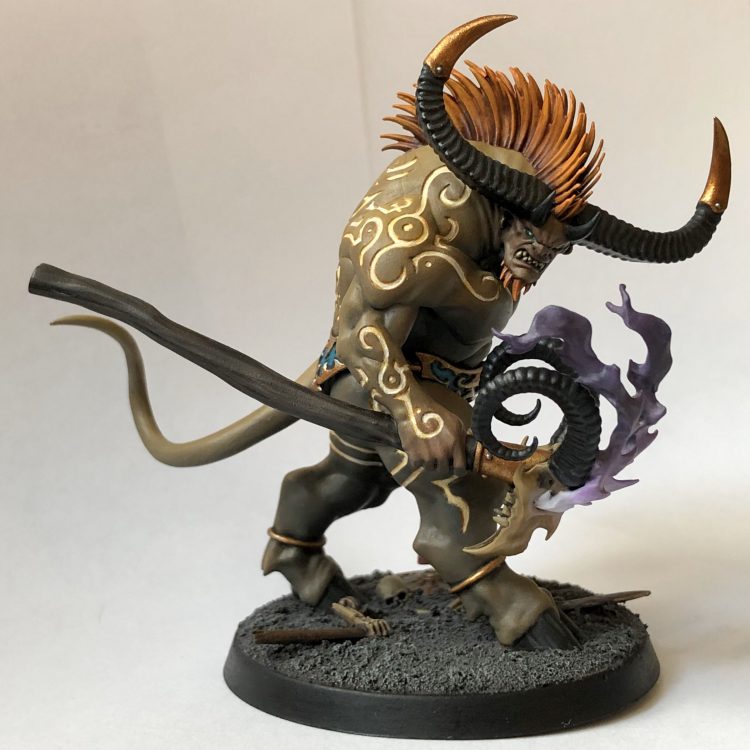
Lupe: So does emotional outcome require agency?
James: I don’t think it requires it, because we can be emotionally influenced by watching a film or reading a book. You know, you don’t have to have agency in these things, but I think when you have agency and you can see your actions having an outcome, then that is a much more reliable way of getting an emotional outcome because compared to a film… a film is carefully crafted by lots of people to make sure that the pacing is correct. There’s a soundtrack that guides the viewers’ emotion. You don’t have that in the game.
So what you have to have instead is that engagement. That sells games, right? The engagement, the interaction between players and the game. So I think that you don’t need to have agency for emotion to happen, but I think in the context of a game, it certainly helps. I mean, I don’t know about you, but I’ve played quite a few games where I felt like there’s nothing I can really do to impact things and mainly I just feel kind of bored waiting for it to end.
Lupe: You’re waiting for the mechanics to resolve themselves so you can leave.
James: Yeah, exactly. And even games like Blood Bowl, I think Blood Bowl is a great example. Blood Bowl is a game which has very, very, complex systems in play. It’s a game with a very steep learning curve, and it’s a game with a very long playtime for what it is. Which means that if you’re playing at a very high level, fair enough, you’re going to get a lot out of it. But if you’re playing at a low to intermediate level, you can find yourself in a situation where you are very aware that you have lost the game early on, and there’s nothing you can do to come back from it, and you are locked in this system. You have to carry on playing, because conceding is seen as poor sportsmanship. You have to carry on playing until it’s all over, and you just find yourself becoming more and more bored, more and more despairing as you watch your team being taken apart by a team that’s more accomplished than you.
Lupe: So did that influence your design of Blitz Bowl?
James: Oh, definitely. Blitz Bowl, if anything, is like a big laundry list of things which, if I had the chance to write Blood Bowl from scratch, I would have done. Because when I first applied for the job in specialist games I wasn’t aware that they were already doing a Blood Bowl game, so I kind of collected a lot of thoughts – if they wanted to re-do Blood Bowl, here’s what I would do, just to kind of modernise it.
Because the thing is, Blood Bowl comes from a different era. Blood Bowl is from the late 80s/early 90s, depending on which edition you’re looking at, when people weren’t thinking as much about this sort of thing, about emotion and player agency. It was very much based on existing games at the time, and the systems were the way they were because that’s how Warhammer worked. And it just sort of grew out of that. Whereas I think that games now, you know, that bar has been raised. Now, as a designer, you have to think about the player experience. You have to think about frustration. How frustrating is it going to be to play Blood Bowl, for a new player? It’s incredibly frustrating.
And so Blitz Bowl was meant to be a much happier, friendly game, and it kind of turned out to be a very different type of game. I would actually say there, that you can play both and have a good time, and I don’t think one replaces the other. I think that Blitz Bowl is about resource management, whereas Blood bowl is about risk mitigation. So two very different kinds of things.
Lupe: Yeah, I think that’s a fair assessment. I certainly know people who play both and enjoy both. I’ve played both and enjoyed both myself.
It’s interesting that you say that they’re from a different time, because I remember we were in the pub a couple of years ago and Marc Gascoigne [editor: one of the developers on the original Blood Bowl] was there. He described to me how they had basically written it on their lunch breaks. It was very much, from the perspective that he was telling, the kind of a thing they were sort of rattling off to have some fun at lunch time, and they wrote a couple of sports games – he mentioned Elf Cricket being the other one that they worked on that was not released.
It makes me wonder though, if part of this, about game design being about assessing the agency and assessing the emotional outcomes, whether that’s a product of years, effectively, of development of the principles and concepts of games. Because if we go back to the early days of Warhammer, or Warhammer 40K, there’s a lot that feels very clunky to us. But there are also a lot of people who love games from that era, and it doesn’t seem to all be nostalgia, and I’m fascinated to know why.
James: I mean, I think they serve different things. I think games back then tended to lean towards – and a massive generalisation here – but your war games specifically tended to lean very heavily on simulation as opposed to abstraction. And so a lot of the design intent was, well, let’s make this – air quotes – “realistic”. You know “how should an elf fight”? What are the rules for “how an orc takes damage”, whatever it might be, it was more about that. And I think at that point, the satisfaction comes from the, dare I say it, the crunch. You know, figuring out the stats and figuring out the best strategies and counter-strategies and things.
Lupe: The puzzle of it.
James: Yeah, precisely. And I think that’s something which there is still definitely a massive market for, but I think games have broadened to include more than that. And I think the best approach is one which kind of draws on both things but without going too far. When you look back at some of the games from that era, the late eighties, they’re impenetrable. And I think there’s a whole thing to be said for the fact that the people playing them, there was a much narrower audience, it was people who were really heavily into it.
Whereas now we have much more casual gamers who come in and play games because they like having a bit of fun with some friends and painting some miniatures occasionally. They don’t want to get into the deep strategy. So I think a balanced approach is the one that gets the most attention these days. But that’s not to say there isn’t a market for it.
Lupe: That, interestingly, leads into the thing that I was going to ask you next, which is I was going to say that I started playing second edition Warhammer 40k and all that business, and I think one thing that you could not describe second edition 40k as is balanced.
James: No. No.
Lupe: And I feel like a lot of the development of war games from that point has often been focused on the idea of making things more “balanced”, and I’m using air quotes now that you can’t see.
James: Yeah, I can actually hear them.
Lupe: Excellent. I wonder how much of that perception of “balance”, of things being “fair”, is less about the factions or the units being equally matched, and more about the emotional outcomes meeting expectations?
James: Absolutely. There’s a thing I said when we did our Designing Miniature War Games seminar recently: a game doesn’t need to be balanced, it needs to not be perceptibly imbalanced. I think that’s two very different things. When a game feels wrong, when a player notices that it’s wrong, that’s when you have an issue, and a lot of the time, that does come down to not meeting expectations either mechanically or emotively.
So you know, it’s like going back to that example you had earlier, if your unit of Primaris Space Marines shoots a unit of Grots and does next to nothing – and it’s not because you rolled a particularly bad dice roll, it’s just that’s how it’s come out – well, that doesn’t match with your expectation of the narrative. It doesn’t match the expectation of what you want, or how this unit has been described, and presumably won’t match with your expectation of what you thought when you looked at the page and thought “this unit will do this thing”.
I’ve seen it lots of times in playtesting where I’ve written a unit for a game that was like “this unit will be really cool for these reasons”, put it in front of Playtesters and they’d play a game and be utterly underwhelmed because I just misjudged some of the numbers or I’d misjudged an effect, or I’d remembered a rule wrong or something, and you have to go back to the drawing board. I think, yeah, absolutely the emotional impact of the thing and the impact on the table of something can make players very aware of a balance issue, which they might completely ignore if it otherwise feels right.
You know, it’s what I’ve always said when it comes to setting points values for things, a points calculator will never give you the correct answer. It will give you a starting point. It’ll give you a ballpark figure. We used to get lots of emails saying, “I’m a maths student. I’d like to volunteer to create a mathematical points calculator for Warhammer 40,000 that will fix all the points values”. And the problem is that you can’t. A generator will never give you the correct answer because there isn’t necessarily an empirically correct answer. So much of it comes down to how things feel, and consensus is a powerful thing. If people get the idea “oh, this unit just kind of sucks”, that can be because it doesn’t feel right. Not necessarily because it is mechanically imbalanced.
Lupe: Does that make part of game design “narrative expectation setting”?
James: I think so. I think especially in war games. I mean, you can look at – there’s all different avenues of game design – but specifically in miniature war games, I think definitely that is part of it. It’s the reason why when I was at [Games] Workshop, we had two teams. We had rules writers and background writers, and we would work together, we would make sure that it lines up in that way. Otherwise, yeah, people are going to have their expectations dashed, and that is where you start getting cries of imbalance.
Lupe: One of the things that Goonhammer obviously does is we have our Hammer of Math series, and we pay a lot of attention to win rates competitively at tournaments and such. But one of things that I’ve always felt is there are several different kinds of balance. The kind of balance that most people talk about when they’re playing, where they have a feel for “does the game feel balanced? Is it fair?” is quite different from that win rate. One of the reasons I think that is we see a lot of people complaining or crowing or whatever on various social media platforms about how well their army is performing, how overpowered this other army is, so on and so forth, when the win rates don’t reflect that even slightly.
James: Well, I think humans are dreadful at data, that’s the whole thing. People are dreadful at understanding stats and being unbiased and emotion plays a huge role with that, right?
Lupe: Is part of the game designer’s job to understand and play to the biases in players, the human condition?
James: Yeah. Part of game design is understanding the human condition. That is, like, step one.
Lupe: That’s us, insight into the human condition. That’s our job.
James: Exactly. I think you’re right, though.
Lupe: Amazing isn’t it, because people’s ability to judge the percentage likelihood of outcomes is notoriously bad.
James: Yeah, there’s the joke isn’t there? The ongoing joke in war games discourse that you have a one in six outcome, and rolling a one happens approximately 50% of the time. But I think that that’s really indicative of how people view stats sometimes.
Lupe: Is that something you actively take into consideration when you’re designing games?
James: Yeah, I think you have to. I mean, I try to initially be as unbiased and empirical as possible when I’m first designing the thing. But as soon as playtesting starts, that’s when I start looking at bias.
Because the thing is, if I try to preempt it and write the game based on the biases I think will happen, then I’m including my own biases as the main template for that, and that’s got issues of its own. Whereas if I try to write a game that is – air quotes – “balanced”, initially, then once the playtest feedback starts coming in I start looking at that and start looking at how the play testers are feeling about that. How are we getting to these pieces of feedback? What are the key points here? That’s when I start trying to take all that stuff into account.
It’s actually interesting, it’s one of the reasons why it’s good to have regular playtesters that you use repeatedly, because then you start getting a feel for what their biases are. You know, “this person really, really, really gets excited when he gets to roll lots of dice”. “This player is all about getting to use big stompy models and frankly, she doesn’t care what goes on as long as she gets to have a big stompy model that gets to do a big stompy attack, and that’s it”.
You kind of go through and you start picking up these inherent biases and you can start reading into the playtest feedback in that way. That’s not to say it’s not also important to have as many new testers as possible because it absolutely is. But when you get a group that you start to know, then yeah, you start seeing it. And that does come down to what their preferences are, what are the things that get them excited. Which again comes back to emotion, doesn’t it?
Lupe: Yeah, it’s interesting. I’m thinking about the balance query in relation to the games that you wrote while you were at Games Workshop, and Necromunda is a game that I think has a lot of love for the core mechanics, but is often considered unbalanced.
James: Yeah. I recently saw it described as a hot mess, and I can’t disagree with it.
Lupe: Oh, lovely. That’s good. Of course that’s all stuff that was introduced after you left [they laugh]. But it’s interesting, isn’t it? Because when you talk to players who love Necromunda, half of what they love is the perceived lack of balance, is the sort of chaos of it. It certainly is very Necromunda. It feels very Necromunda.
James: Yeah, It’s interesting, isn’t it? I think part of that was definitely one of the core issues with Necromunda development. We talked about this briefly before, but there were many cooks with a spoon in the broth, so to speak. And one key leading voice really wanted to go back to, like, Rogue Trader, Confrontation, the old days where it was quite complex and you needed a GM to run things a lot of time. I actually feel like that’s almost the best way to play Necromunda these days. I feel like having a GM for games is probably the best way to do it because it feels like the rule set is so sprawling now, with so much stuff, some of which is contradictory, some of which overrides other things, that you sort of need an arbiter (or arbitrator, if you will), to consider what is Law and what isn’t. I just think they should probably just go whole hog and just say that’s how the game is played
Lupe: Interesting. Okay, so almost I guess passing the buck forwards in terms of balance.
James: Exactly. Hey, if role playing game designers can pass the buck onto game masters, you know?
Lupe: Alright, alright, Settle down [both laugh].
James: Yeah, I say this as someone who’s written a couple of role playing games where that’s absolutely the case, and it just feels like cheating. But it’s apparently allowed.
Lupe: It’s interesting because I think this is probably aside for the interview, but I think one of the reasons that I like Powered By The Apocalypse so much is that Baker opens by going “No, there are rules. You have to follow them. None of this nonsense.”
James: Yeah, yeah, yeah, “Get back in your seat, GM, here’s how you play. These are not guidelines”.
Lupe: “Don’t get above yourself here. You’re not in charge.”
James: Exactly.
Lupe: So, to try and wrap up the thoughts here, we started off talking about the emotional outcomes, and I don’t think we’ve really moved on from that necessarily. But it feels a lot like what we’re saying is that when you’re approaching game design, considering how players feel about the outcomes is more important, really, than the statistical likelihood or perfect statistical balance of the mechanics?
James: I think it’s equally important. I’d be cautious about saying it’s more important, but certainly equally important. And I think the main thing is, the reason why it’s worth stressing is, I guarantee it’s a thing that newcomers to game design will not consider. I say this from having, I mean, we do a lot of rules review. We help a lot of people out with their games and one of the main things we see is people who – especially if they’re writing a war game – they focus on the stats, the balance, the factions, all of that. They don’t think about what the player experience is. And I think it’s something that you need to think about, especially if, you know, you want to design your own war game, it’s a pretty crowded market out there. There’s quite a lot of stuff going, so your game needs to feel good to play, right? Otherwise, people won’t come back to it.
That wraps up this month’s inaugural article but if you have any questions or feedback for us, drop them in the comments below. Or if you have an idea for a topic you’d like to see James and Lupe tackle next, you can let us know by emailing us at contact@goonhammer.com. And if you’re interested in more on game design from Needy Cat Games, you can sign up for their courses on their website.
